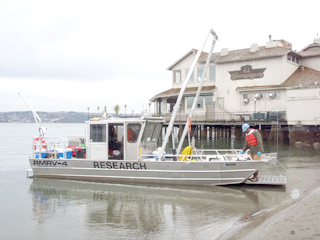
Gravity Environmental
Specialty: Sediment and water quality resources
Management: Shawn Hinz, managing partner
Founded: 2002
Headquarters: Fall City
2009 revenues: $850,000
Projected 2010 revenues: $1.2 million
Current projects: Water quality and fish tissue sampling along 140 miles on the upper Columbia River; sediment core sampling on the Foss Waterway; environmental construction management and water quality monitoring at the Koniambo Nickel Project, New Caledonia; sediment core sampling on the Rio Grande River, New Mexico; support work on the Gulf of Mexico oil spill cleanup

Photo courtesy of Gravity Environmental Gravity Environmental used this boat to survey wood debris deposits for clean-up and redevelopment of waterfront property on the Foss Waterway in Tacoma.
|
Shawn Hinz, managing partner of Gravity Environmental, said it’s been a busy two years for his company. Recently, work got even busier due to an unplanned project: the Gulf of Mexico oil disaster.
Gravity has been in the gulf since July when the oil well was successfully capped. It was brought in because of a piece of specialized equipment called a high-volume sampling system. The machine, worth about $15,000, was designed by Gravity. Hinz said there is one other company in the world that has a similar machine.
The machine concentrates water to do testing and sampling. One problem in the gulf, Hinz said, is the spill has spread “just everywhere,” diluting the oil so it can’t be identified with standard sampling measures.
The spill in the gulf is a sad turn of events and work there is difficult because quarters are cramped and heat is intense. But Hinz said it is exciting because specialists from different institutions, companies and regions are collaborating together.
“There’s been a lot of opportunity for research and development of new technology because no one’s really ever dealt with a spill of this magnitude,” he said. “I think there’s been some really neat cooperation and teaming between the different parties.”
Hinz said it’s unclear how long Gravity will be in the gulf. He said sampling continued 15 years after the Exxon Valdez spill.
Special machines
The high-volume sampling system is just one unique machine in Gravity’s arsenal. The company, which is made up of Hinz and eight on-call staff, reinvests over 50 percent of its profits into research and development.
The machines are integral to Gravity’s niche of sediment sampling and trace contaminant water testing because they make work easier while helping Gravity get its foot in the door with new clients or projects.
Gravity recently got involved in the Passaic River project in New Jersey, one of the biggest Superfund projects in the country. It would generally be hard for a consultant to jump into something like that, Hinz said, but the Superfund team wanted to use Gravity’s sediment sampling equipment.
About half of Gravity’s work is public and half is private. Over the past year, the public sector slowed but the private sector kept the firm busy.
Gravity does work on cleanup and Superfund sites. Hinz said responsible parties always have cleanup work.
The Duwamish Waterway cleanup, for instance, has been going on for over a decade.
“Those projects have a life of their own,” he said. “They’re a bit outside of current economics in a way, or current administrations.”
Safe to be small
Gravity’s size has also helped it weather the downturn. Being small has given it flexibility to take on different opportunities and focus on research and development. At the same time, Gravity supports large engineering and science consulting firms so if it grew into a big company, it would become competition.
“It’s been an active role ... to stay small,” he said. “It keeps it a little safer. It’s definitely easier to survive. I think a lot of the smaller companies seem to be surviving a little better than the larger companies.”
Hinz said being on the West Coast has helped business, as this area has stricter standards than the rest of the country. He sees a trend in more Pacific Northwest firms doing work on the East Coast.
Next year, Gravity looks busy with a number of international, national and regional projects. But Hinz is hoping to stay home more.
“We’ve been working on some fairly critical projects, which is really satisfying to me,” he said. “I’m looking forward to more local Northwest work.”